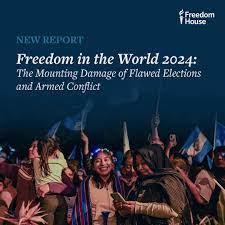
https://freedomhouse.org/report/freedom-world/2024/mounting-damage-flawe...
Key Findings
Global freedom declined for the 18th consecutive year in 2023. The breadth and depth of the deterioration were extensive. Political rights and civil liberties were diminished in 52 countries, while only 21 countries made improvements. Flawed elections and armed conflict contributed to the decline, endangering freedom and causing severe human suffering.
Widespread problems with elections, including violence and manipulation, drove deterioration in rights and freedoms. Ecuador was downgraded from Free to Partly Free status because its elections were disrupted by violent criminal organizations, which killed several state officials and political candidates. In Cambodia, Guatemala, Poland, Turkey, and Zimbabwe, incumbents tried to control electoral competition, hinder their political opponents, or prevent them from taking power after election day. While Thailand edged over the line from Not Free to Partly Free thanks to more competitive elections, a military-drafted constitution allowed unelected entities to distort the subsequent government-formation process. Military forces also ousted the elected government in Niger, leading to the second-largest score decline of the year, and adding another case to the wave of coups in the Sahel region of Africa that began in 2020.
Armed conflicts and threats of authoritarian aggression made the world less safe and less democratic. Around the world, violent conflict—often driven by authoritarian aggression—caused death and destruction and imperiled freedom. Nagorno-Karabakh, a territory that has long received its own assessment in this report, suffered the year’s largest recorded decline in freedom and moved from Partly Free to Not Free after a blockade and military offensive by the Azerbaijani regime led to the capitulation of its separatist government and the de facto expulsion of its ethnic Armenian population. The Kremlin’s full-scale invasion of Ukraine continued for a second year, further degrading basic rights in occupied areas and prompting more intense repression in Russia itself. Civilians also bore the brunt of the conflict between Israel and the Palestinian militant group Hamas, a civil war stemming from the 2021 military coup in Myanmar, and brutal fighting between rival military and paramilitary factions in Sudan.
The denial of political rights and civil liberties in disputed territories dragged down freedom in the associated countries, including some democracies. People living in disputed territories without access to self-determination were especially vulnerable to abuses by authorities with no meaningful checks on their power. Beijing continued to clamp down on the few freedoms available to residents of Hong Kong and Tibet, while the Russian regime advanced its efforts to repress vulnerable populations in Crimea and enlist local inhabitants in its war of aggression. Repression in disputed territories was largely perpetrated by autocratic regimes, but the democratically elected governments of Israel and India were complicit in violating basic rights in the West Bank and Gaza Strip and in Indian-administered Kashmir, respectively. These harmful policies were intertwined with threats to democratic principles and institutions within the larger countries.
Pluralism is under attack but remains a source of strength for all societies. The rejection of pluralism—the peaceful coexistence of people with different political ideas, religions, or ethnic identities—by authoritarian leaders and armed groups produced repression, violence, and a steep decline in overall freedom in 2023. These trends are creating an environment that is unfavorable to democracy just as the world enters a consequential year of elections. But by drawing strength from diversity, protecting dissent, and building international coalitions to support their own norms and values, democratic forces can still reverse the long decline in global freedom.
Introduction
Global freedom declined for the 18th consecutive year in 2023. The scope and scale of deterioration were extensive, affecting one-fifth of the world’s population. Almost everywhere, the downturn in rights was driven by attacks on pluralism—the peaceful coexistence of people with different political ideas, religions, or ethnic identities—that harmed elections and sowed violence. These intensifying assaults on a core feature of democracy reinforce the urgent need to support the groups and individuals, including human rights defenders and journalists, who are on the front lines of the struggle for freedom worldwide.
A total of 52 countries suffered declines over the past year, while only 21 improved. The manipulation of elections was among the leading causes of global erosion in freedom. In Cambodia, Guatemala, Poland, Turkey, and Zimbabwe, incumbents took steps to prevent the political opposition from competing on an even playing field. Leaders in El Salvador and Venezuela bent the rules to ensure their own victories in planned contests. Ecuador’s elections were marred by widespread violence, including the murders of several state officials and political candidates. As a result, that country declined from Free to Partly Free status. Thailand inched up from Not Free to Partly Free thanks to highly competitive national elections, but a military-drafted constitution allowed unelected forces to distort the government-formation process and box out the leading opposition party.
Coups continued to obliterate democratic institutions and strip away people’s right to choose their leaders. In July, Niger became the sixth country in the Sahel region of Africa—after Burkina Faso, Chad, Guinea, Mali, and Sudan—to experience a coup since 2020. A military junta ousted the democratically elected government, resulting in an 18-point decline on Freedom in the World’s 100-point scale. Freedoms also continued to deteriorate in Burkina Faso, which suffered two coups in 2022.









